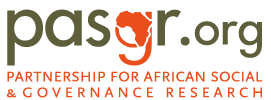Contact Info
- 6th Floor, I & M Building 2nd Ngong Avenue, Upper Hill
- +254 (0)20 2985000; +254 (0)729 111031 / +254 (0)731 000065
- info@pasgr.org
- Office Hrs: Today 9.00am to 6.00pm
Women’s contribution to making public institutions work more efficiently and effectively is no longer in doubt in Nigeria, when given the opportunity.
But women have continued to fail at being able to compete favourably against men at local, state, and federal government elections. This has significant economic implications.
Of Nigeria’s 36 states, 20 have at least one woman in the House of Assembly. This means 16 states have no single woman in their Houses of Assembly. For the 20 states, women occupy 39 (7.2%) out of 540 seats.
This is despite the fact that women entrepreneurs in the Fast Moving Consumer Goods (FMCG) supply chain are surmounting the tough business environment in Nigeria and creating enterprises where women are making profitable business decisions.
“Women need to learn how men in politics operate. If politics is a dirty game, women should find out how it is played because men continuously take advantage of this gap and pit women against themselves sometimes,” Mufuliat Fijabi, chief executive officer, the Nigerian Women’s Trust Fund said.
The Partnership for African Social and Governance Research, and the Institute of Development Studies in partnership with Leadership Effectiveness, Accountability and Professionalism (LEAP) Africa have initiated a new study that seeks to explore the conditions needed to enable women to break through the obstacles stopping them in politics. The study focuses on Lagos due to the city’s social, religious and ethnic diversity as well as its economic progress.
Put differently, the study explores the conditions and processes that lead to empowerment and accountability for women in Fragile, Conflict, Violence Affected Settings (FCVAS). The study will also expose the strategy women use, how, when and what factors enable women’s ability to be active and effective in politics in Mozambique, Nigeria, and Pakistan seen as fragile with records of conflicts and in some cases armed conflicts.
“At the recent review of the Sustainable Development Goals, one of the areas that caught the attention of stakeholders was how women navigate social and political issues to gain access to opportunities,” Femi Taiwo, executive director, LEAP Africa said during the Utafiti Sera stakeholder engagement and launch workshop brief in Lagos.
The study will show what factors at household and community levels enable women to counter gender-biased social norms to participate in political processes as citizens or representatives. It will analyse when and how women take part in collective action processes at the community level and exercise leadership and will illustrate what strategies women use to promote their group interests within male-dominated formal political and community level institutions.
“Policies are not neutral and politics play a critical role in determining public policies. The Partnership for African Social and Government Research (PASGR) was founded to ensure public policymakers take advantage of social science research so that research outcomes become transformative and engaging,” Tade Aina, executive director, PASGR said.
Facilitating greater and effective women’s access to politics in environments that suffer from decades of male-dominated political structures, fragile, violent and conflict-laden has become common. But this new study has adopted a new approach that bridges the gap between knowledge producers, users and those affected by creating a research-policy community.
This has been reposted from https://www.pressreader.com/nigeria/business-day-nigeria/20191101/281633897037229
A4EA AAU advanced research design African universities agriculture Applied Quantitative Methods APSP ARD CABE call for applications cash transfers COVID-19 employment energy EOI Featured higher education IDS INCLUDE Job opportunity LEAP Africa MMRC MRPP opportunities opportunity PAMOJA TRUST partnerships PASGR PDT pedagogy PedaL press release professional development and training professional training public policy Research research methods scholarships social protection Social sciences University of Ibadan University of Pretoria utafiti sera vacancy Youth employment

6th Floor, I & M Building
2nd Ngong Avenue, Upper Hill
P.O. Box 76418-00508
Nairobi, Kenya
Email: info@pasgr.org
Tel: +254 (0)20 2985000;
+254 (0)729 111031 / +254 (0)731 000065
Legal counsel provided by Hurwit & Associates and Muthoga Gaturu & Co. Advocates
